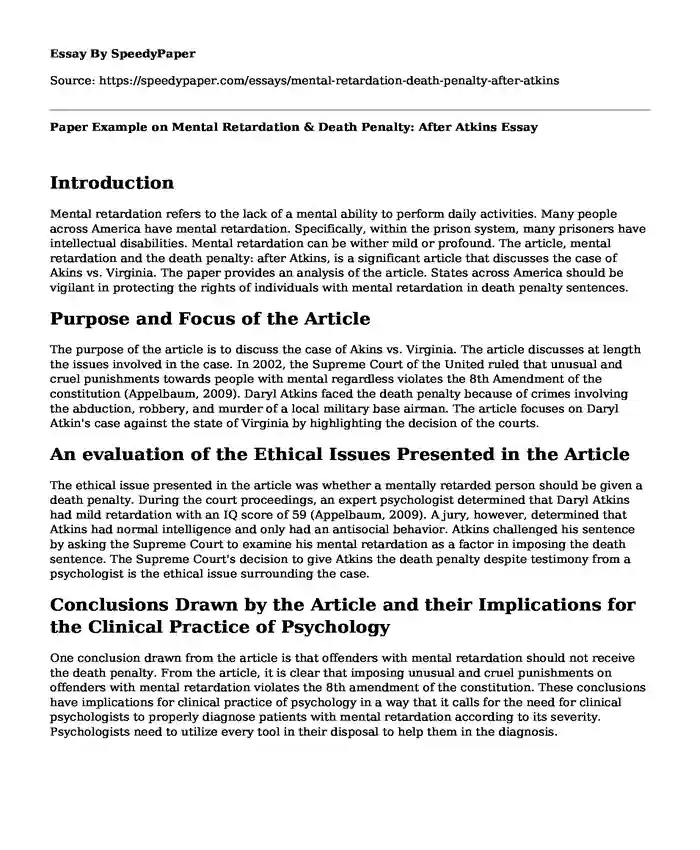
| Type of paper: | Essay |
| Categories: | Mental health Death penalty |
| Pages: | 3 |
| Wordcount: | 612 words |
Introduction
Mental retardation refers to the lack of a mental ability to perform daily activities. Many people across America have mental retardation. Specifically, within the prison system, many prisoners have intellectual disabilities. Mental retardation can be wither mild or profound. The article, mental retardation and the death penalty: after Atkins, is a significant article that discusses the case of Akins vs. Virginia. The paper provides an analysis of the article. States across America should be vigilant in protecting the rights of individuals with mental retardation in death penalty sentences.
Purpose and Focus of the Article
The purpose of the article is to discuss the case of Akins vs. Virginia. The article discusses at length the issues involved in the case. In 2002, the Supreme Court of the United ruled that unusual and cruel punishments towards people with mental regardless violates the 8th Amendment of the constitution (Appelbaum, 2009). Daryl Atkins faced the death penalty because of crimes involving the abduction, robbery, and murder of a local military base airman. The article focuses on Daryl Atkin's case against the state of Virginia by highlighting the decision of the courts.
An evaluation of the Ethical Issues Presented in the Article
The ethical issue presented in the article was whether a mentally retarded person should be given a death penalty. During the court proceedings, an expert psychologist determined that Daryl Atkins had mild retardation with an IQ score of 59 (Appelbaum, 2009). A jury, however, determined that Atkins had normal intelligence and only had an antisocial behavior. Atkins challenged his sentence by asking the Supreme Court to examine his mental retardation as a factor in imposing the death sentence. The Supreme Court's decision to give Atkins the death penalty despite testimony from a psychologist is the ethical issue surrounding the case.
Conclusions Drawn by the Article and their Implications for the Clinical Practice of Psychology
One conclusion drawn from the article is that offenders with mental retardation should not receive the death penalty. From the article, it is clear that imposing unusual and cruel punishments on offenders with mental retardation violates the 8th amendment of the constitution. These conclusions have implications for clinical practice of psychology in a way that it calls for the need for clinical psychologists to properly diagnose patients with mental retardation according to its severity. Psychologists need to utilize every tool in their disposal to help them in the diagnosis.
An Analysis of the Implications of the Ethical Issues Presented in the Article to the Practice of Psychology
The ethical issue presented in the article is that a person who has mental retardation should not receive the death penalty because it is against their right. In the practice of psychology, applying the code of ethics during testing is significant because psychologists will manage to draw an appropriate diagnosis. In the case of Atkins, the jury gave Atkins life in prison, and then overturned their decision and gave him the death penalty. Psychologists need to effectively consider the "Flynn Effect," which makes IQ scores to rise during testing (Appelbaum, 2009). Applying the code of ethics would help psychologists to effectively test a patient and draw conclusions during the clinical practice.
Conclusion
The article is useful because it provides useful insights into the topic of intellectual disability and the death penalty. From reading the article, it is agreeable that clinical experts have to apply the code of ethics during the testing of patients with mental retardation. Overall, the jury should be keen when interpreting testimony from a psychology expert to guide them in their decision.
Reference
Appelbaum, P. S. (2009). Mental retardation and the death penalty: After Atkins. Psychiatric
Services, 60(10), 1295-1297. https://ps.psychiatryonline.org/doi/full/10.1176/ps.2009.60.10.1295
Cite this page
Paper Example on Mental Retardation & Death Penalty: After Atkins. (2023, Jul 29). Retrieved from https://speedypaper.com/essays/mental-retardation-death-penalty-after-atkins
Request Removal
If you are the original author of this essay and no longer wish to have it published on the SpeedyPaper website, please click below to request its removal:
- Essay Sample on the Labeling Language for the Treatment of Parkinson's Disease
- Diastolic Heart Failure: Diagnosis and Treatment
- The United States Is Not Really a Democracy - Essay Example
- Exercise Program Design - Free Paper with a Case Study
- Free Paper with a Case Study of Therapeutic Recreation Service Model Application
- Free Essay: Fat-soluble and Water-soluble Vitamins
- Pulmonary Illness Related to E-Cigarette Use in Illinois and Wisconsin - Preliminary Report
Popular categories




